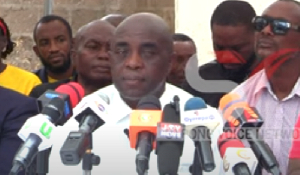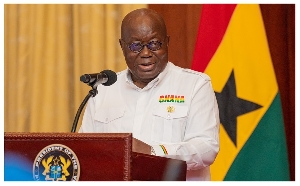Opinions of Monday, 15 January 2007
Columnist: Mijjimma, Abdul
The President And His Successors -A Rejoinder
Permit me to respond to an editorial of the Stateman published on Ghanaweb of Tuesday, January 9, 2007, titled the President and his successor. The Stateman editorial was not only predicated with liars and factual inaccuracies, but also an insult to the mental capacity of Ghanaians to judge both the NDC and the NPP. The premise of article demonstrates how desperate the ruling NPP is in it bid to retain power forever in Ghana. In fact so desperate that the mouthpiece of party (The Stateman) is prepared to peddle in obvious lies in its bid to sway Ghanaians voters. It is also very ironic that a party that pride itself of democratic credential would suggest a one party rule, even though it inherited power through a peaceful and democratic means. If the NDC had suggested this before the 2000 elections heaven would have broken loose.
The editorial suggested that countries such Germany, the United Kingdom, Canada among others had retain one party in much of their history. This is an obvious a fallacy that a newspaper of Stateman stature should not be peddling. It is a fact that almost all the countries that the Stateman made reference to had changed and continued to change parties throughout the cause their history. For the purpose of this rejoinder we shall review the party political history of the two major countries the Stateman had referred in its editorial as having a party rule in much of their democratic history. First, lets examine the Prime Ministers who occupied the famous 10 Downing Street in the UK since 1721 when democracy was said to have began in that country. Between 1721 and 1886, political power in the United Kingdom alternated between the Whig Party and the Tories, even though the Whig dominated in terms of the number of governments formed. From 1852 to date, political power had alternated between almost all the political parties in the House of Commons namely the Conservatives, the Liberals, and the Labour Party (for further information please refer to ). It is therefore very erroneous for the editorial to suggest that one party dominated the much of the over 300 years of United Kingdom political process. When in fact no one party had occupied the seat of government for even half a century let alone most their democratic history.
The fallacy of the Stateman editorial is even compounded and made worse if the Canadian democratic experiment is factored into the equation. Even a cursory look at the Canadian political history does not in the least suggested that one party had dominated much of their political history. Like the UK, political power alternated quite evenly at the earlier stages by two parties, Liberals and the Liberal Conservatives. From 1867 to date, the Conservative Parties of Canada have been in government 15 times, whiles the Liberals were in government 12 times, and the defunct Unionist Party was in power only once. Throughout the over 100 years of democracy in Canada no party have held power for more than two decades. More importantly, the two longest Canadian Prime Ministers, Sir John A. Mcdonald and the Right Hon Wilfrid Laurier were from different parties, Liberal Conservatives and Liberal Party respectively.
It is therefore totally wrong on the part of the editorial for suggesting that for much of these countries history a single party dominated the mantle of power. Also, in making it case for the continual stay of the NPP in power the editorial of the Stateman missed a very important fact about the nature and structure of parliamentary democracy. In parliamentary democracy much of governance is done at the Parliamentary level where both the opposition and ruling party iron out government legislations and make input thereof. Parties could also form coalition governments in such a system. The values of such governments reflect the respective values of the parties in coalition. This explains why in Germany, Italy, among others, a party could be in government for a long period of time. However, such a government is always in concert with other parties in a coalition.
In writing this rejoinder I am not taking or usurping the rights of the newspaper to draw conclusions based on facts. In fact the Stateman has an editorial right to campaign for retaining the NPP into office if the newspaper philosophizes with the party. Because we all have our biases when it comes to politics in Ghana. What prompted this rejoinder however, is the use of misinformation, half truths, and falsehood to throw dust in the eyes of the reading public for the sole purposes of propaganda. I do agree with the editorial?s point that voters should rationally analyze the two parties base on their records and merits. But rationality is a very subjective commodity, what is rational and okay for the Stateman may not be rational for many Ghanaians, and certainly a one party rule is not the most rational ideal of a functioning democracy.
By advocating for the retention of the NPP, the Stateman is asking us to forget all the misdeeds of the NPP. The editorial is suggesting that we should forget the Bambagate, IFC and CNTC loan scandals, Annie Affair, the Hotel Kuffour, the use of state resources to fund telecommunication facilities for party people, the numerous and wasteful presidential travels and vacations, and above all the use of the Castle as a kick back receiving office for the New Patriotic Party. Forgetting these scandalous acts are obviously not rational. In a situation were our poor workers continue to slave away whiles a few in government could gorge themselves on the fat of the land rationality is obviously needed to show them the exit doors. Giving NPP another term will be disastrous, let alone maintain them for life. Give NPP another eight years and even the trees will cry for photosynthesis.














